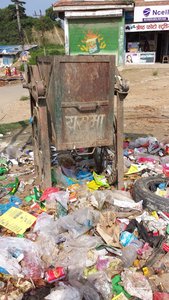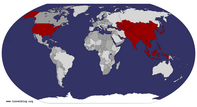Advertisement
Published: October 26th 2015

 Trash bin
Trash bin
There are bins, but nobody seems to know how to use themI hate to say it, but Nepal could use a good scrubbing. It's awash in plastic bottles, bags , bits of detritus and organic waste that just seems to accumulate in large piles outside of houses and shops, or wherever two or three are gathered to wait for the bus. I've been reluctant to write about this because I didn't want to insult my Nepali hosts, who were more than kind to me during my sojourn there. But the fact is, the country is a mess.
What struck me most during the month I was there volunteer teaching at Kathmandu University, was that no one except for us westerners seemed at all fazed by the situation. It's not even on most people's radar. For my part, I spent a lot of time mulling the situation over. It occurred to me initially that maybe the problem was a lack of trash bins. But then, on a walk through the Municipality of Dhulikhel where I was staying for the month, I noticed what appeared to be a trash bin that looked like a metal sculpture of a pushcart. Trouble was, though, that none of the trash actually made it into

 20150909_090225
20150909_090225
Another bin. This one damaged or vandalizedthe cart. The ground around it was littered with garbage, as if the citizens had sort of got the idea that trash should be discarded there, but that their understanding had faltered when it came to actually getting it into the bin.
Okay, I thought, maybe there's no municipal trash collection or city dump. Then one morning, as I was sitting waiting for a car to take me to the University, I saw –Que Milagro!! – a garbage truck, or the Nepalese equivalent -- a hefty looking two-wheeled cart towed by a small tractor driven by a tough looking woman. It was filled to overflowing and reeked to high heaven, but damn it, it was an honest-to-god garbage truck, which said to me that on some level the locals were aware of the problem and were doing something about it.
I was so surprised, in fact, that I walked across the street and questioned the garbage lady via a translator. Yes, she said, the municipality was picking up the trash. Her job was to get it to a local dump where it was either buried or burned. I never found out which.

 20150913_101903
20150913_101903
A Nepali garbage wagon.Shortly thereafter, a Nepali friend and I were touring Katmandu in a car and driver we'd hired for the day. At one point, we found ourselves driving through a local vegetable market where I saw another of those idiosyncratic garbage trucks loaded down with vegetable cuttings. A garbage lady was sweeping up the last of the stuff and tossing it into the truck. I asked my friend to ask her where she took the waste to dispose of it. She broke into a hearty cackle and said "To the river, of course." I was utterly shocked. I mean if nothing else, the stuff could have been composted and distributed to the farmers. To make matters worse, Kathmandu's Bagmati River is already a festering cesspit, so why exacerbate the situation by dumping organic waste into it?
Ironically, a few minutes later, we found ourselves on an overpass that looked down upon Kathmandu municipal trash dump. I was flummoxed. Why could she not have brought the vegetable leavings there?
It quickly dawned on me that the solution to Nepal's trash problem lay in education. Simply put, people's consciousness needed to be raised. I

 gutter-bottles
gutter-bottles
plastic bottles land in the gutters and eventually get into the ground water, which makes them a potential cancer hazard for generations to comemean, after all, and to be fair, there was a time when we Americans displayed much the same indifference to our own fouled environment. Back in the late 50s, early 60s, I remember an anti littering campaign aimed at getting people to stop flinging trash out the windows of their automobiles.
I seem to recall a book on the subject entitled "The Beer Can by the Side of the Highway," that pointed up the problem. And then of course, there were those endearing PSAs admonishing the citizenry to pick up after themselves. Don't be a Litterbug; Littering is unlAwful, and Keep America Beautiful are three tag lines that come to mind. Even the Lone Star State, not known for its environmental progressivism, got into the act with a typically threatening frontier message that read, Don't Mess with Texas.
At some point, the various legislatures – local, state and federal -- began levying fines for littering, which was probably what put an end to the problem. My point is that sensitivity to the issue doesn't come naturally, be it in Nepal or the USA. It requires education,

 20150926_081714
20150926_081714
Chickens recycle some of it.sensitization, consciousness-raising. Maybe start with the school kids.
Which in turn led me to the idea that maybe we could get my students at Katmandu University to adopt a particularly egregious block in Dhulikhel and clean it up. "We could pick a Saturday and show up en mass with rakes and bins and clean up a whole block," I said to the chair of my department one morning. "It'd be a great way to instill a sense of respect for the environment in both the students and the local residents. We do this sort of thing all the time back home. Neighbors get together for a community clean up day. There's even a program where companies adopt a stretch of highway and agree to clean it up on a regular basis. The company's name is put up on a bill board by the highway, so it's free publicity for them."
"It would never work here," he said with a touch of impatience at yet another outsider who thought he knew better than the locals what was best for their country. "The parents would object to their children picking up trash and not getting paid
for it. And also, here people feel like 'why should I pick up something that someone else threw down? Why don't they pick it up themselves?'"
I pointed out that since 86% of Nepal's GDP comes from tourism, wouldn't it behoove them to clean up the environment? I can't think of a bigger turn-off for environmentally sensitive tourists than to see piles of trash everywhere they turn. "The tourists don't come here," he said, meaning Dhulikhel. "They go trekking in the mountains."
Well, maybe so. But even the mountains are not immune. In recent months, reports have been appearing in the international media about the trash problem at Everest Base Camp, which has become so filthy and overrun with garbage that the Indian government -- the Indian GOVernment for crissakes!!! – saw fit to send in a crack team of Army mountaineers to haul it off at the rate of 10 Kilos per trooper. What a slap in the face to the government of Nepal and its people, for whom there is no love lost when it comes to India.
I contacted an acquaintance back in Denver, the architect Douglas Eichelberger,

 Trash1
Trash1
There's trash everywhere you lookwho has devised a building system designed to address both the trash problem and the need for cheap housing in developing countries. His idea is to fill rectangular wire baskets with old plastic bottles and bags, stack them up and cover them with stucco. This, I thought, might be an ideal solution for Nepal, post quake. There's a crying need for housing there right now, and in using discarded plastic bags and bottles as a building material, they could simultaneously house the people and scour the environment.
Eichelberger sent me a PowerPoint which I began showing to anyone who would listen. Among them was an associate dean of the School of Engineering at the university. "It's a good idea," he said. "But I don't think it would work for housing. People here would not like to sleep in a house made from plastic bottles used by lower caste people…Perhaps for a barn or a shed?"
This really threw me. Never had it occurred to me that the caste system might play a part in the country's trash problem. But there it was, and once I heard it, a lot of things became clear to

 20150926_130508
20150926_130508
Kathmandu Municipal trash dumpme. Of course my students could not be induced to jump in on a clean-up day. Most of them were upper caste kids for whom touching something previously handled – even potentially -- by someone of a lower caste would be anathema.
It's tempting to just give the Nepali's a pass on the trash situation. After the earthquake the country has a lot on its plate; infrastructure shattered, thousands left homeless, and most recently a fuel embargo by India in response to Nepal's new constitution that has all but crippled the country. From that perspective, the trash problem looks pretty paltry -- a First World concern in a Third World country struggling to make ends meet.
On the other hand, what would it take to bend over and pick up a bit of litter and toss it in a bin? Many of my students told me that the earthquake might be an impetus for a revolution in the country. While they're at it, why not a revolution in the way they see and care for their surroundings?
Post Script: At the airport on my way out of the country,
I noticed a sign on the wall prohibiting litter, with a fine of 200 Rs ($2.00 US) for each offence. Hey, I thought, it's a step in the right direction.
Advertisement
Tot: 0.126s; Tpl: 0.011s; cc: 11; qc: 46; dbt: 0.0603s; 1; m:domysql w:travelblog (10.17.0.13); sld: 1;
; mem: 1.1mb











Katy
non-member comment
Trash Awareness
Dear Don, your article was engrossing. It's a story that happens everywhere. If we are not careful of ourselves and one another, all the plastic in the world will eventually end up in the ocean. Awareness is the beginning of wisdom. Thank you for your informative photos and story.